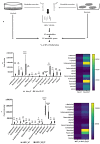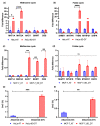Untargeted Metabolomics Showed Accumulation of One-Carbon Metabolites to Facilitate DNA Methylation during Extracellular Matrix Detachment of Cancer Cells
- PMID: 35323710
- PMCID: PMC8951017
- DOI: 10.3390/metabo12030267
Untargeted Metabolomics Showed Accumulation of One-Carbon Metabolites to Facilitate DNA Methylation during Extracellular Matrix Detachment of Cancer Cells
Abstract
Tumor cells detached from the extracellular matrix (ECM) undergo anoikis resistance and metabolic reprogramming to facilitate cancer cell survival and promote metastasis. During ECM detachment, cancer cells utilize genomic methylation to regulate transcriptional events. One-carbon (1C) metabolism is a well-known contributor of SAM, a global substrate for methylation reactions, especially DNA methylation. DNA methylation-mediated repression of NK cell ligands MICA and MICB during ECM detachment has been overlooked. In the current work, we quantitated the impact of ECM detachment on one-carbon metabolites, expression of 1C regulatory pathway genes, and total methylation levels. Our results showed that ECM detachment promotes the accumulation of one-carbon metabolites and induces regulatory pathway genes and total DNA methylation. Furthermore, we measured the expression of well-known targets of DNA methylation in NK cell ligands in cancer cells, namely, MICA/B, during ECM detachment and observed low expression compared to ECM-attached cancer cells. Finally, we treated the ECM-detached cancer cells with vitamin C (a global methylation inhibitor) and observed a reduction in the promoter methylation of NK cell ligands, resulting in MICA/B re-expression. Treatment with vitamin C was also found to reduce global DNA methylation levels in ECM-detached cancer cells.
Keywords: DNA methylation; ECM detachment; NKG2DLs; anoikis; one-carbon metabolism.
Conflict of interest statement
The authors declare no conflict of interest.
Figures





Similar articles
-
Compound C, a Broad Kinase Inhibitor Alters Metabolic Fingerprinting of Extra Cellular Matrix Detached Cancer Cells.Front Oncol. 2021 Feb 25;11:612778. doi: 10.3389/fonc.2021.612778. eCollection 2021. Front Oncol. 2021. PMID: 33718166 Free PMC article.
-
Metabolism during ECM Detachment: Achilles Heel of Cancer Cells?Trends Cancer. 2017 Jul;3(7):475-481. doi: 10.1016/j.trecan.2017.04.009. Epub 2017 May 23. Trends Cancer. 2017. PMID: 28718402 Review.
-
Extracellular matrix detached cancer cells resist oxidative stress by increasing histone demethylase KDM6 activity.Saudi J Biol Sci. 2024 Jan;31(1):103871. doi: 10.1016/j.sjbs.2023.103871. Epub 2023 Nov 9. Saudi J Biol Sci. 2024. PMID: 38107766 Free PMC article.
-
The regulation of cancer cell death and metabolism by extracellular matrix attachment.Semin Cell Dev Biol. 2012 Jun;23(4):402-11. doi: 10.1016/j.semcdb.2012.04.007. Epub 2012 May 11. Semin Cell Dev Biol. 2012. PMID: 22579674 Review.
-
Oncogenic Ras differentially regulates metabolism and anoikis in extracellular matrix-detached cells.Cell Death Differ. 2016 Aug;23(8):1271-82. doi: 10.1038/cdd.2016.15. Epub 2016 Feb 26. Cell Death Differ. 2016. PMID: 26915296 Free PMC article.
Cited by
-
Integrative metabolomics-genomics analysis identifies key networks in a stem cell-based model of schizophrenia.Mol Psychiatry. 2024 Oct;29(10):3128-3140. doi: 10.1038/s41380-024-02568-8. Epub 2024 Apr 29. Mol Psychiatry. 2024. PMID: 38684795 Free PMC article.
-
Structural-Guided Identification of Small Molecule Inhibitor of UHRF1 Methyltransferase Activity.Front Genet. 2022 Aug 3;13:928884. doi: 10.3389/fgene.2022.928884. eCollection 2022. Front Genet. 2022. PMID: 35991572 Free PMC article.
-
Exploration of metabolic responses towards hypoxia mimetic DMOG in cancer cells by using untargeted metabolomics.Saudi J Biol Sci. 2022 Oct;29(10):103426. doi: 10.1016/j.sjbs.2022.103426. Epub 2022 Aug 22. Saudi J Biol Sci. 2022. PMID: 36091722 Free PMC article.
-
Matrix Stiffness-Mediated DNA Methylation in Endothelial Cells.Cell Mol Bioeng. 2025 Jan 17;18(1):29-38. doi: 10.1007/s12195-024-00836-9. eCollection 2025 Feb. Cell Mol Bioeng. 2025. PMID: 39949487 Free PMC article.
References
-
- Mason J.A., Davison-Versagli C.A., Leliaert A.K., Pape D.J., McCallister C., Zuo J., Durbin S.M., Buchheit C.L., Zhang S., Schafer Z.T. Oncogenic Ras Differentially Regulates Metabolism and Anoikis in Extracellular Matrix-Detached Cells. Cell Death Differ. 2016;23:1271–1282. doi: 10.1038/cdd.2016.15. - DOI - PMC - PubMed
-
- Ranganathan S., Kumar S., Mohanty S.S., Jolly M.K., Rangarajan A. Cellular Plasticity in Matrix-Attached and -Detached Cells: Implications in Metastasis. J. Indian Inst. Sci. 2020;100:525–536. doi: 10.1007/s41745-020-00179-0. - DOI
Grants and funding
LinkOut - more resources
Full Text Sources

